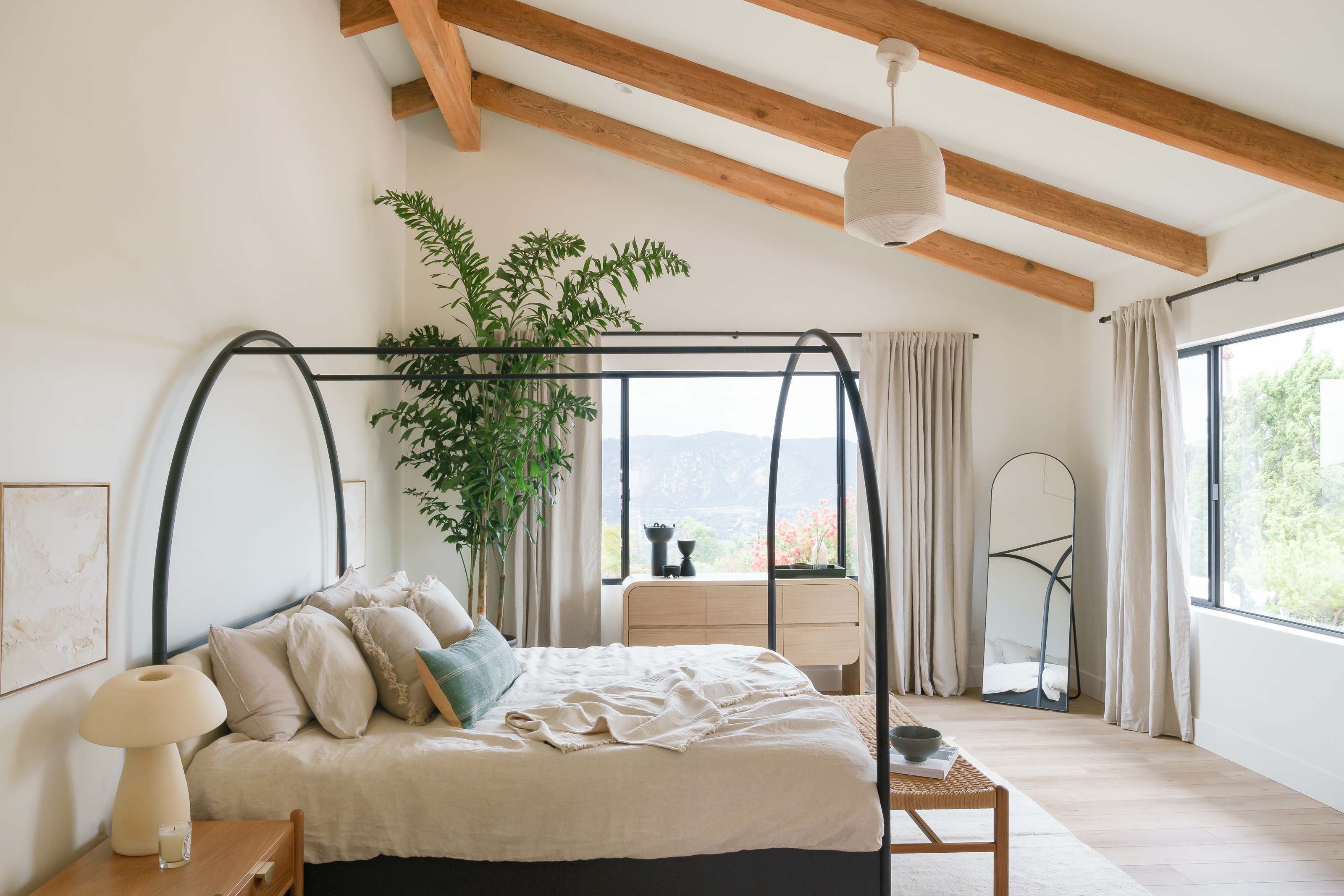
Indoor trees are the new must-have piece of furniture. They add interest and texture and literal life to a room and there's also something so novel about seeing a fully grown tree indoors amongst sofas and beds and kitchens. However, if you aren't super green-thumbed like me, the idea of trying to keep a tree thriving is slightly daunting but luckily there are plenty of low-maintenance options that cope well indoors and don't take too much looking after (I can even vouch for some of these, which are currently thriving in my home).
We asked plant experts what are the best indoor trees that can cope with a little... neglect. Maybe you aren't around enough to water your indoor garden daily, or your home doesn't get a ton of natural light or you just don't have a good track record with plants. Whatever your issue, here are the easiest to care for indoor trees that both look wonderful and are super low maintenance.
1. Money tree
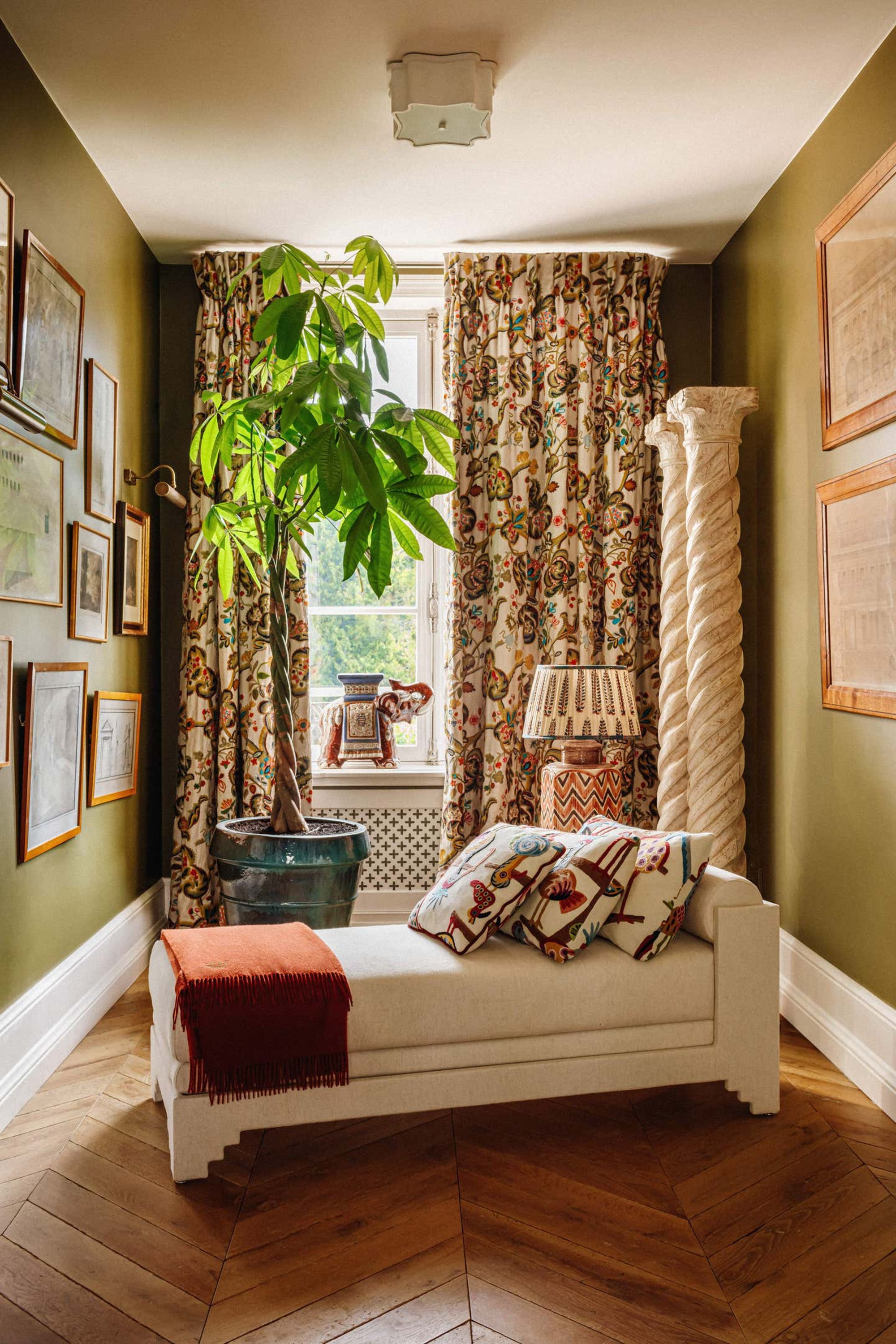
The money tree, or pachira aquatica, is a super popular indoor tree. Its wonderful twisted trunk and glossy, star-like leaves make it more of a piece of decor than a house plant. It's considered a low-maintenance indoor tree since it doesn't need direct natural light (it can even thrive under artificial light) and it can cope with being overwatered – a mistake us none green-thumbed people are always making
'Pachira Aquatica is the ultimate low-maintenance indoor tree that adds instant jungle impact with its large leaf span and ability to grow quickly,' says Jemma Charman of Green Rooms Market. 'These un-fussy trees will thrive with bright, but indirect light (not to be kept in direct sunlight), and watered once the top inch or so of soil is dry. However, they are native to the swamps of Central and South America so unlike most houseplants they can take a bit of overzealous watering!'
Size on arrival: 14 - 16 inches tall
Price: $59.95
Care guide: Money trees don't like drafts, and are happy in indirect light.
2. Euphorbia Eritrea

For a super chic, modern look bring in a giant cactus. They give such a cool Med-vibe if you plant them up in large terracotta pots and we say go as big as your room (and budget) can handle. They are also perfect as low maintenance plants for an indoor gardening, needing barely any watering just plenty of sun to thrive. One thing to consider is that these are not pet friendly houseplants, I had a huge one in the kitchen when I was growing up and remember the milky latex that would sometimes appear on the plant (both gross and fascinating for a child) and this can be harmful if digested, so keep out of the way on any furry friends or small children.
'Euphorbia Eritrea might look like giant cacti but are in fact part of the euphorbia family. They are probably the lowest maintenance large indoor plant as they need watering around once or twice a month in summer and even less in winter. They just prefer a bright location and will often flower on their tips when happy,' says Plant Drop founder, Dom Butler.
3. Schefflera
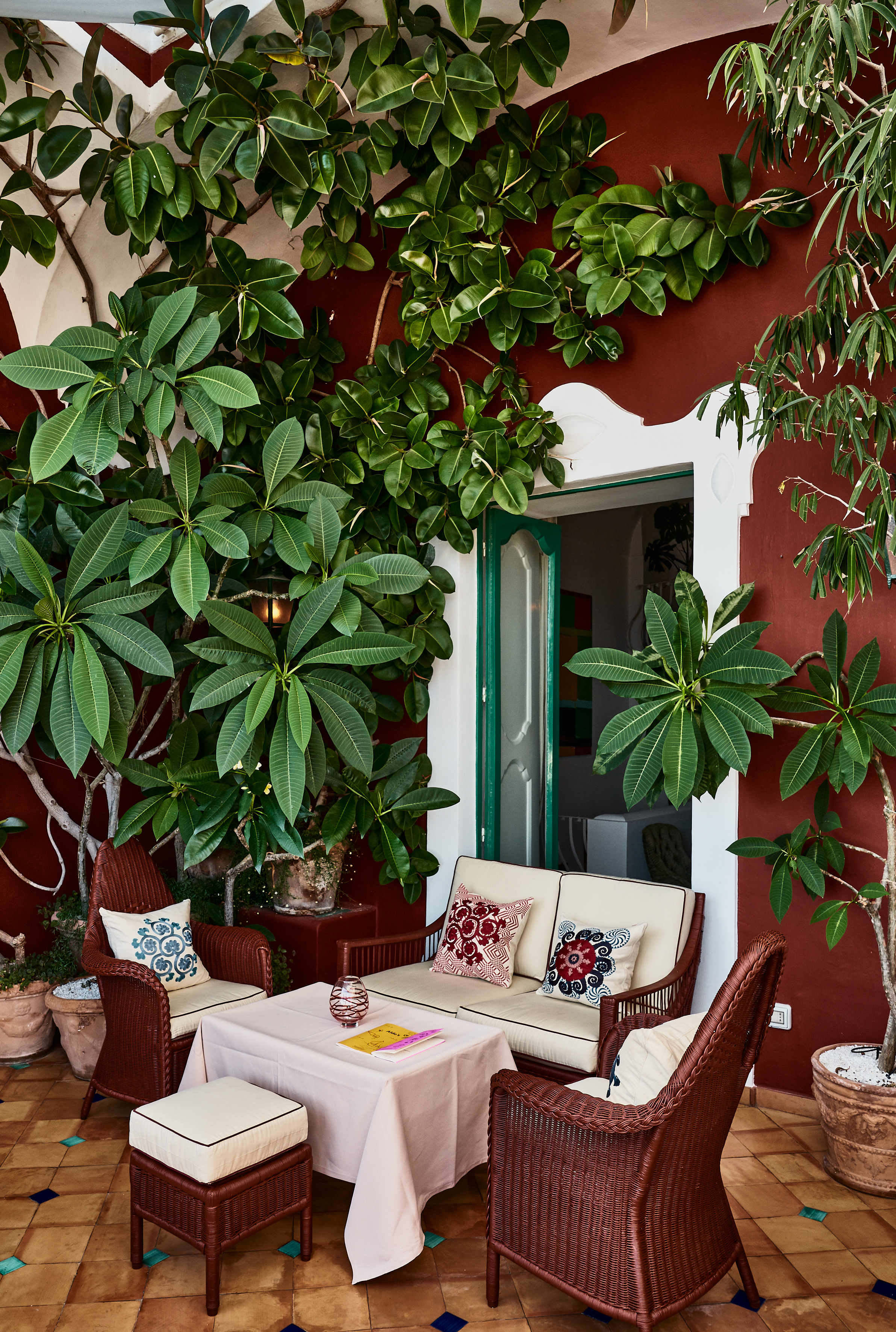
Schefflera, also known as the umbrella plant, adds a tropical vibe to any room and its long shiny leaves can grow impressively large, impressively quickly, so ideal if you want to make an impact with a larger indoor tree.
It's very easy to care for and can cope in most light level and just need watering when the soil feels dry. Look out for yellowing leaves which means you are over-watering, and if the plant starts to get a bit leggy it probably means it's not getting enough sunlight so try a new spot.
'These trees are super tough and also very drought tolerant, plus they can deal with very direct sunlight through to medium light so can be kept in all sorts of spaces. Available in several leaf styles and forms such as bushes, multistem trees, and standard trees. My favorite is 'Compacta' for its glossy green leaves.' explains Dom.
Size on arrival: in a 3 gallon pot
Price: $64.95
Care guide: keep it out of drafts and direct light in Spring or Summer, put it into light in Winter.
4. Areca Palm
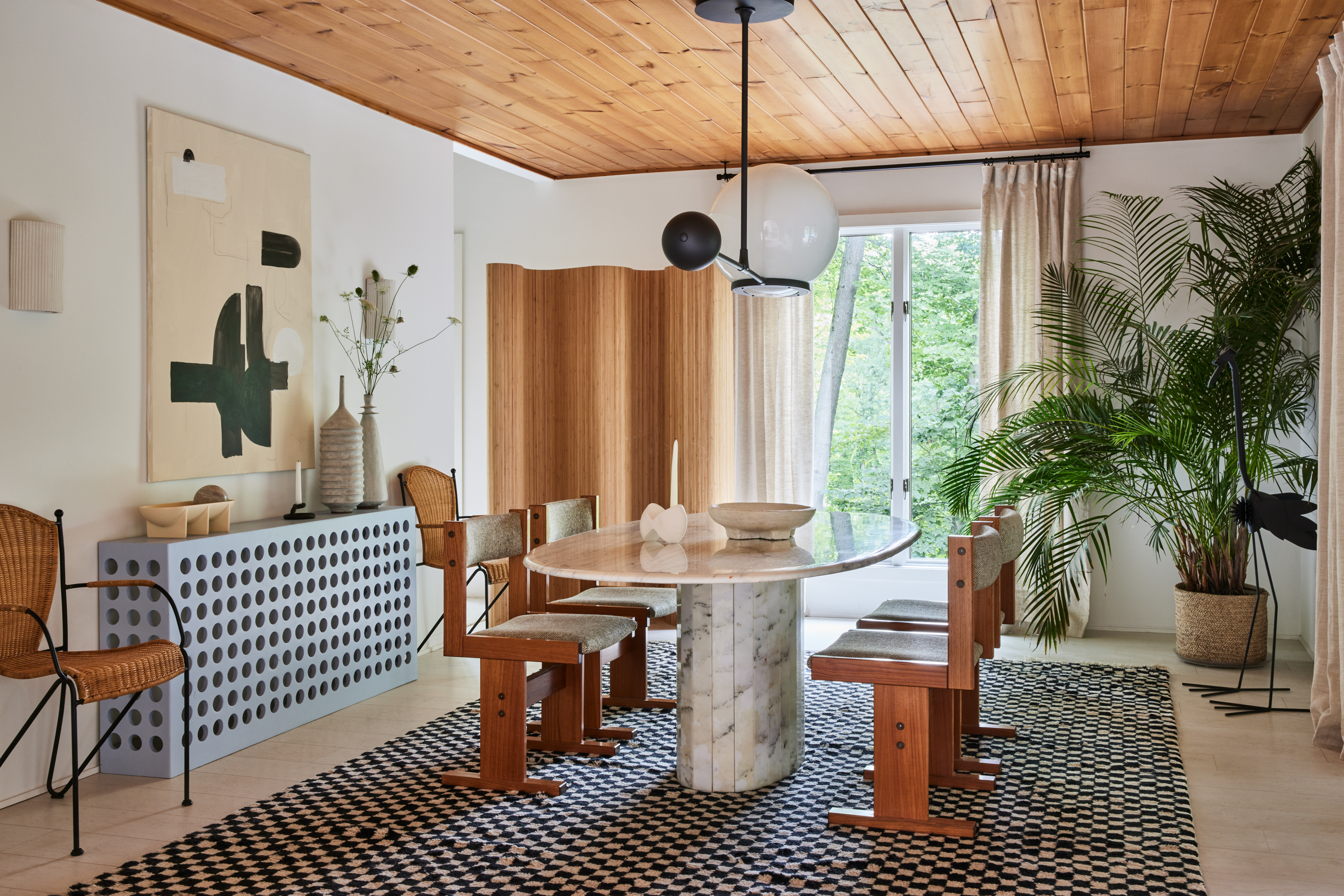
Palms are one of the most popular indoor trees, but when it comes to palm care it can differ from type to type, so if you are after a low-maintenance option go with the glorious Areca Palm – its soft fonds will give any room an elegant touch. I can also confirm my palm survived a week solo absolutely fine.
'If you’re looking for a tree to boost your wellness as well as your interior style credentials, the Areca Palm tree is my top pick,' says Whitney Bromberg Hawkings, founder of Flowerbx. 'With intricate leaves that set it apart from other palm varieties, the Areca is well-loved for its air-filtering qualities, something that’ll benefit every kind of surrounding. Growing at its best in a well-lit spot with partial shade, this variety works perfectly for homes throughout the seasons – just remember to keep it out of direct sunlight and away from draughts or extreme temperature changes.'
'The Areca Palm is another indoor tree that originates from the tropics, so checking the soil stays moist all the way down to the root is key, as well as a light regular misting. To do so without the risk of root damage, be sure to use a drainage system such as placing stones at the base of your plant, or removing the inner container from its pot when you rehydrate it, to avoid stale water gathering at the bottom.' she adds.
5. Fiddle leaf fig
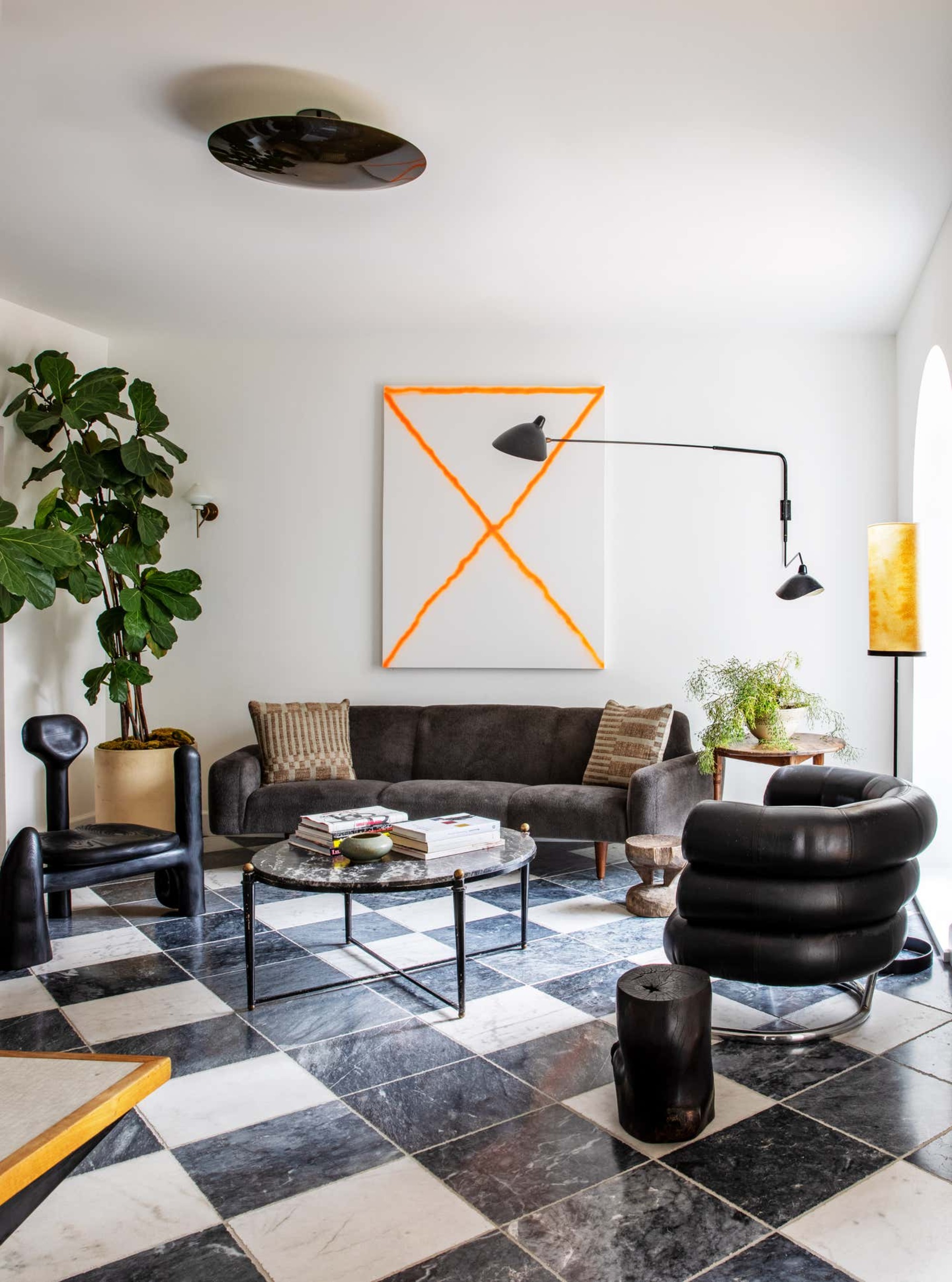
Fiddle leaf figs are the indoor tree to make a home look more expensive and chic and lucky for everyone, they are pretty low-maintenance. Mine is positioned in a hallway that doesn't get a ton of light and it's grown so quickly in the last six months – I've had six new leaves since it came home with me. I pop it in the bath and give it a quick water every two weeks, and wipe down the leaves to get rid of the dust at the same time. It seems very content with just that amount of care.
'With unique violin-shaped leaves in a glossy finish and the ability to grow up to 6ft tall, they are the most considered of all interior greenery and a super on trend houseplant. Although Fiddle Leaf Fig trees are native to the tropics, they are surprisingly easy to care for, able to withstand – and thrive! – within home spaces or offices.' says Whitney.
'Simply place your tree in a bright spot away from direct sunlight to avoid those beautiful leaves from becoming sun-scorched. My top tip for keeping your Fiddle Leaf Fig tree at its best is to avoid overwatering, particularly in the winter months. From spring to autumn, keep the topsoil moist, meanwhile, let the soil dry out a little more in the colder season to avoid root rot.'
'Aside from watering, Fiddle Leaf Fig trees enjoy a regular misting to emulate their tropical environment and may want an occasional dusting of their leaves. The ultimate show-stopping indoor tree, with little maintenance required!'
Size on arrival: 3 - 4 feet
Price: $89.95
Care: Keep it by an east-facing window and free from drafts
6. Dragon tree
'The Dragon Tree is an iconic houseplant perfect for new plant parents that want to add some height to their indoor gardens. Slender stems lead to large clusters of fine leaves. Bright indirect light is best for this Dracena, meaning close to a North, East, or West facing window, or a couple of meters back from a South facing window. When to water? Stick your finger far down into the soil, if it is dry then it is time to water,' explains Jemma.
Mark McCance, founder of Hortology agrees that Dragon Trees are adaptable and pretty easy to care for. 'Dragon Trees, come in various forms and sizes, adding diversity to indoor plant collections. They have upright, spiky leaves that create a unique visual appeal and can be styled as separate branched plants, or grouped together into bushier displays. Most Dracaena species tolerate lower light conditions, making them versatile for different indoor environments. You only need to water in moderation and allow the top inch of soil to dry before watering again. Prune dead or yellowing leaves to maintain a neat appearance,' he advises.
7. Artificial indoor trees

I couldn't not add this option in. If you really can't keep a tree alive, or looking for a tree that will survive you leaving it for weeks on end, an artificial tree is the way to go.
And they have come a long way in terms of how realistic they look too, they are no longer instantly recognizable as fake, with plastic branches and unnaturally green leaves, I've seen some that I would never believe were fake. The best options aren't cheap, but they are far cheaper than spending all that money on an indoor tree only for it to die on you a few months in.
What are the benefits of indoor trees?
There are so many proven benefits to bringing a tree into your home beyond the aesthetics. Plant expert and founder of Hortology Mark McCance let us in on a few:
Reduced Noise and Air Pollution: In urban environments, indoor trees can help mitigate some of the negative effects of noise and air pollution, offering a bit of respite from the external environment.
Improved Air Quality: Indoor trees, like other plants, can help improve air quality by filtering out toxins and releasing oxygen during photosynthesis. They can absorb pollutants such as formaldehyde, benzene, and trichloroethylene, thus contributing to a healthier indoor environment.
Humidity Regulation: Indoor trees are known for releasing moisture into the air through a process called transpiration. This can help maintain an optimal level of humidity in the room, which is especially beneficial in dry indoor environments, helping to alleviate conditions like dry skin, sore throats, and respiratory issues.
Stress Reduction: The presence of indoor trees has been shown to have a positive impact on mental well-being. Being around nature and greenery can reduce stress, and anxiety, and even improve mood. The visual connection to nature can create a sense of tranquillity and calmness.
Natural Sound Absorption: Indoor trees with dense foliage can help absorb sound, reducing echo and improving acoustic quality within a room. This can be particularly useful in spaces with hard surfaces that tend to reflect sound.
Enhanced Productivity and Creativity: Studies have suggested that the presence of indoor plants, including trees, in workspaces or study areas can enhance creativity, focus, and productivity. The improved indoor environment can contribute to a more comfortable and inspiring space.







